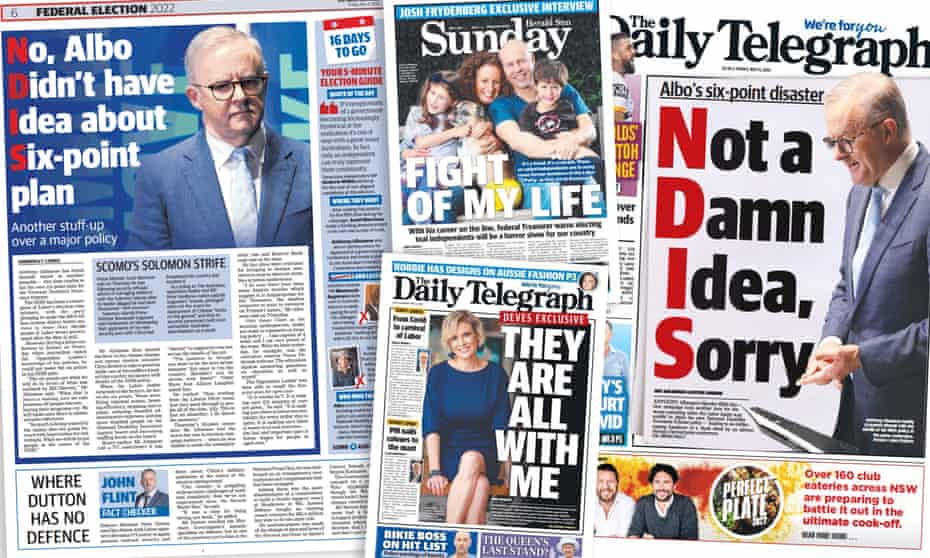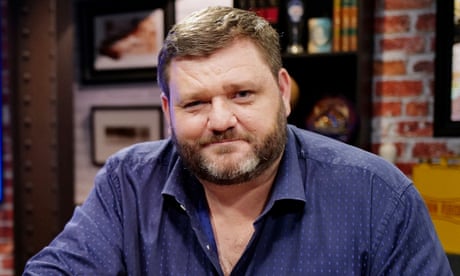Extract from The Guardian

Few election campaigns have seen the performance of news outlets so intensely monitored, and perhaps no other election outcome has exposed such a gaping disconnect between a major news supplier and voters.
And the consequences indicate more voters are bypassing traditional media and making their own judgments on information from other suppliers, such as reputable social media outlets and online journalism.

At the centre of this extraordinary detachment of political coverage from reality are the Australian newspapers of News Corp, from the national daily the Australian to the popular tabloids in Brisbane, Sydney, Melbourne and Adelaide in particular.
Only the Northern Territory News, among its most visible publications, editorialised for a Labor victory.
News outlets back candidates for many reasons, the most salient being because they genuinely believe, after an honest evaluation, they would do the job properly, or better than the alternative.
It’s not unusual for a newspaper to stand by its principled assessment. In fact, that is an important purpose of their work.
But promoting an evaluation which isn’t genuine and balanced is a betrayal of that purpose.
In that vein, the brutal and relentless savaging of independent candidates by News Corp was telling. The attacks knew few boundaries.
“The most destructive, harmful and dangerous vote anyone can make in the forthcoming election is for a teal independent or the Greens,” wrote the Australian’s Greg Sheridan on 3 May. “They are both a direct threat to our national security.”
Well, that didn’t work. The Greens picked up another three seats.
Independents on Saturday stomped home in Sydney, Melbourne and Perth, and television coverage of their triumphs rivalled that given to the outgoing prime minister, Scott Morrison, and his Labor successor, Anthony Albanese.
The News Corp campaign was directed at preserving a two-party political structure – Labor v the Liberal/Nationals coalition – no matter what voters wanted.
But it wasn’t only the prospect of political diversity which agitated the newspaper group. Most of these successful independents were women. And many of the successful ones replaced men.
So, for example, Zoe Daniel took Goldstein from Liberal Tim Wilson, Monique Ryan appears set to do the same to the treasurer, Josh Frydenberg, in Kooyong, and Allegra Spender evicted Dave Sharma in Wentworth.
In some cases News Corp papers attempted a double shot project aimed at bolstering the government and damning an independent. Such as the Herald Sun running what looked like advertising but was a dressed-up front page and centre spread news story on why Kooyong voters should keep Frydenberg and not dally with Ryan.
The singular story of election night was how News Corp, with all its recourses and all its outlets, from newspapers to subscription TV news, couldn’t convince voters to follow its course, at least not in the numbers needed.
It is being seen as a demonstration of impotence in political affairs, and of absence of authority in the group’s claim to speak for the nation.
Academic and journalist Margaret Simons is no chum of News Corp but was not alone when she wrote this in the Sydney Morning Herald on 16 May: “I am not sure News Corporation bothers to deny its bias these days. But could this be the election in which the impotence of its skewed reporting is exposed?”
The election result doesn’t mean the Age and the Sydney Morning Herald convinced voters to back Labor as their election editorials recommended, but it does mean they were alert to voter movement and ready to respond.
News Corp has very good reporters who continued to perform highly during the campaign. For example, two days before polling day Ben Packham from the Australian revealed an embarrassing dispute in the national security committee over aid to Pacific nations, with the foreign minister, Marise Payne, being rebuffed.
And news reporters on Sky News maintained standards on interviewing during the day, although the commentary cohort known as Sky After Dark made little attempt at balance.
But there was a constant rollout of the opinion panjandrums of the News Corp titles tut-tutting uninterrupted over the menace they saw, not just of a Labor government but all those female independents. Some big name writers should worry they look rather silly.
All legacy media might worry as well.
One aspect of the election campaign, anecdotally at least, was that voters knew what they wanted in news and opinion and were open to fresh avenues of information.
They watched press conferences live on the ABC or Sky News, or as they were livestreamed from online sites. Many younger voters didn’t need the newspapers their parents relied on.
The Greens even advertised on Grindr.

No comments:
Post a Comment